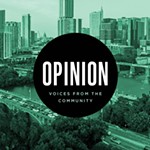Opinion: Let Go of Identity Politics and Vote
Turning Texas blue won't turn it into California
By Anna Near, Fri., Oct. 30, 2020
I went on one of my bimonthly pandemic walks with my dad the other day, and he told me he's decided not to vote. Considering the current administration's abysmal response to COVID-19, I managed to only slow my pace for a moment and calmly ask why. His answer: He can't bring himself to vote for Trump, nor any of the other downballot Republicans in Texas, but he also doesn't want our country "turning into a California." His sentiment seems common here in Texas, as people who are from blue states are moving in at an unprecedented rate. And with that, the belief the newcomers will flip our state blue, and then our economy will tank.
I couldn't argue with my father about the desirability of "turning into a California." The state has some of the highest levels of economic disparity in the U.S. It's also true that increasingly high state income taxes and regulations are causing businesses and wealthy individuals to relocate to low-tax states like Texas.
But Democratic policies didn't cause California's economic problems. Rather, the state's history suggests that constituents voted for Democrats in response to problems caused by explosive population growth and an increasing wealth divide. California was a Republican stronghold for almost 40 years before it finally flipped blue in 1992. In the years leading up to that point the state was growing at a rate of 2.5%, one of the fastest in the country. According to the Public Policy Institute of California that's tracked changes in income growth and levels since 1980, the wealth gap started well before California flipped. In fact, the wealth gap was caused by its too-rapid population growth coupled with other Republican policies that still continued to encourage population growth – all while failing to address needs for infrastructure and social safety nets that accompany growth.
Texas is now in the same position as California. Low taxes over the past 40-plus years have culminated in one of the fastest-growing populations in the country, at 2.68%. Our current public education system ranks in the bottom fifth, and yet our Legislature passed a law last year to limit property taxes without offering alternative funding for schools – exactly like California did in 1978. The housing shortage crisis, not to mention road traffic, are other indicators that population growth is in overdrive. The government-sponsored mortgage company Freddie Mac recently reported that "domestic migration is worsening the housing shortage issue in ... high-growth states" like Texas.
I told my father I feel like Texas invited everyone to the barbecue without checking to see whether we had enough brisket, and now Republicans want to let all our guests fight it out with guns. Don't get me wrong, I'm still a Texan – I love a big barbecue and I'm cool with guns – but I'd be embarrassed as hell if any of my guests had to fight it out or left hungry ... not to mention I'd want enough time to lay out the checkered tablecloths, pull on my boots, and cue the band.
Texas now needs to tweak and change some of its policies to address infrastructure, or we will end up worse than California. Growth is great, but too much growth too fast is not great. Just like the Federal Reserve implements a wide range of monetary policies to maintain the health of the country's economy, Texas needs to elect candidates who can operate in our current reality, who can focus on problem-solving instead of labels, and who can bring "lessons learned" by other states to our Legislature. The truth is that the wealth divide has already begun. We are already like California. A Republican might say, "But Texas isn't even blue yet!" and he'd be right. Cue the blue.
Anna Near is an estate planning attorney with Saunders, Norval, Pargaman & Atkins, LLP, and holds a B.A. in English from Rice University and a J.D. from the University of Texas School of Law. Near serves as vice chair on the Texas Book Festival Board and is a member of the Austin Community Foundation Board of Governors.
The Chronicle welcomes submissions of opinion pieces on any topic from the community. Find guidelines and tips at austinchronicle.com/contact/opinion.
Got something to say? The Chronicle welcomes opinion pieces on any topic from the community. Submit yours now at austinchronicle.com/opinion.









